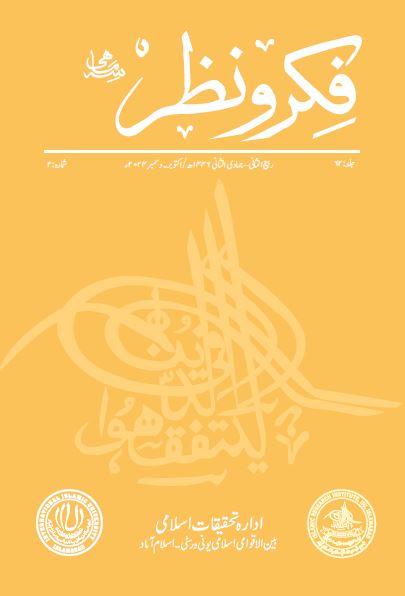اسلامی مالیات کی تاریخ: پاکستان کے اسلامی مالیاتی شعبے کا سفراور عالمی پیشرفت
A History of Islamic Finance: The Journey of Pakistan's Islamic Financial Sector and Global Development
DOI:
https://doi.org/10.52541/fn.v62i2.3469Keywords:
Islamic finance, Pakistan, ribā, Sharīʻah compliance, Islamic banking, legal reform, financial ethicsAbstract
This article provides a comprehensive exploration of the historical evolution of Islamic finance with a particular focus on Pakistan’s journey and its correlation with global trends. Tracing its origins to the ethical and socioeconomic concerns of Muslim scholars in the mid-20th century, the study contextualizes the development of Islamic finance against the backdrop of conventional interest-based systems. It highlights the theoretical underpinnings of Islamic jurisprudence, especially the principle of legal flexibility (taysīr), which has enabled the adaptation and expansion of Islamic financial models globally. The research details five key phases in the institutional evolution of Islamic banking, noting critical milestones from early rural experiments to the establishment of global institutions such as the Islamic Development Bank (IsDB), the AAOIFI, and regional Islamic finance networks. In addition, the article assesses the ethical shortcomings of conventional banking, particularly after the 2007-08 global financial crisis, and illustrates how Islamic finance emerged as a resilient alternative. Special emphasis is placed on Pakistan’s legal and judicial strides in eliminating interest (ribā), culminating in landmark rulings by the Federal Shariat Court. The study further underscores the contributions of modern Islamic research bodies and regulatory frameworks in standardizing and internationalizing Islamic financial practices. By bridging jurisprudential insights with empirical developments, this work fills a critical scholarly gap and contributes to the ongoing discourse on sustainable and Shariah-compliant financial systems.
Downloads
Published
How to Cite
Issue
Section
License
It is a condition of publication in this journal that authors assign copyright or license publication rights of their articles to the Islamic Research Institute, International Islamic University, Islamabad. This enables IRI to ensure full copyright protection and to disseminate the article, and of course the journal, to the widest possible readership in print and electronic formats as appropriate. Furthermore, the authors are required to secure permission if they want to reproduce any figure, table, or extract from the text of another source. This applies to direct reproduction as well as "derivative reproduction" (where you have created a new figure or table which derives substantially from a copyrighted source).
”فکرونظر“ میں شائع ہونے والی نگارشات کا حق اشاعت
”فکرونظر“ میں مقالے کی اشاعت سے پہلے مقالہ نگار کو اپنی نگارشات کا حق اشاعت ادارہ تحقیقات اسلامی، بین الاقوامی اسلامی یونیورسٹی، اسلام آبا د کو تفویض کرنا ہوگا۔ یہ عمل ادارے کے لیے نہ صرف کاپی رائٹ حقوق کی حفاظت یقینی بناتا ہے بلکہ اس کے ذریعے ادارے کے لیے مقالات اور مجلے کی اشاعت، پرنٹ اور الیکٹرانک ہر دو صورتوں میں، زیادہ سے زیادہ قارئین تک ممکن ہوتی ہے۔ علاوہ ازیں، مقالہ نگاران اگر کسی دوسرے مصدر/ مرجع سے کوئی جدول، خاکہ یا اقتباس نقل کر رہے ہیں تو اس کی پیشگی اجازت حاصل کرنا ضروری ہوگا۔ اس کا اطلاق بلاواسطہ یا بالواسطہ ہر دو قسم کی نقل پر ہوگا۔

Attribution-NonCommercial 4.0 International (CC BY-NC 4.0)



